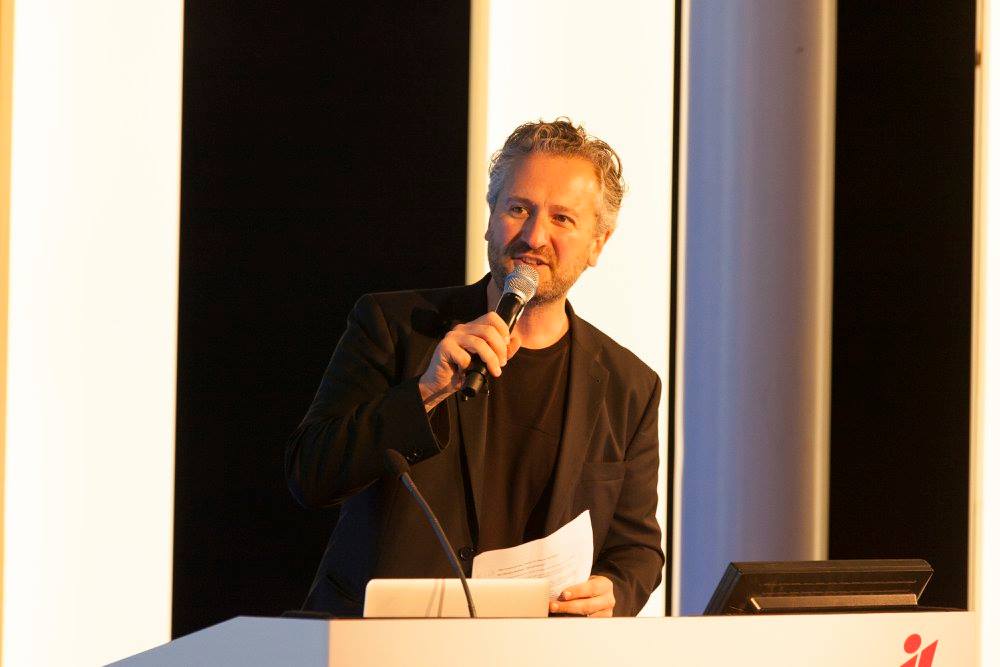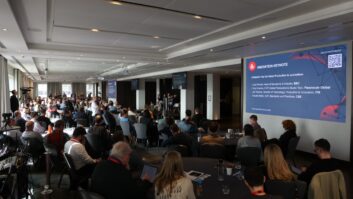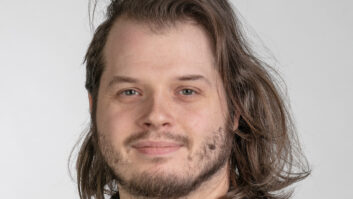
Rising Stars is a hidden gem of a sub-conference nestling within IBC, writes Oisin Lunny (pictured), senior market development manager at mobile messaging technology company OpenMarket, and host of IBC Rising Stars 2016.
Amongst the 55,797 delegates who gathered in Amsterdam last month for the main event, a hand-picked selection of younger participants, who IBC consider to be “Rising Stars”, were treated to two days of carefully curated sessions, tours, workshops and mentoring, for free.
Olga Kim and the team behind Rising Stars brought together some of the most important players imaginable across a diverse range of topics, with the goal of informing, nurturing and inspiring the next generation of talent.
The sessions covered topics such as AR, VR, AI, robotics, social media, editing, streaming, music, extreme filming, new tech trends and the future of entertainment. Well-known brands in the space such as Avid, Roku, NBCUniversal, RTL, Cisco, Ericsson, AJ+, GoPro, BBC, HBO, Intel and Google shared the stage with innovators and startups such as Brandwidth, Filmstro, Inside The Edit, Mo-Sys, MUBI, The Foundry and Infinite Wisdom Studios.
The concept of each session was to help young professionals and entrepreneurs to develop essential skills and knowledge that will help them get ahead in the competitive electronic media and entertainment industry. The delegates are able to see and handle the latest technology, learn how the industry is developing, and also network with those who can really help raise their profile and advance their career.
Day one kicked off with a hilarious but informative session from Dean Johnson, head of innovation at Brandwidth. Johnson somehow managed to cram in AR, VR, AI, hearables, Chewbacca Mom and flying fish into his opening industry overview. His sage advice to the rising stars was that the best way to predict the future is to invent it. AJ+’s Michael Shagoury then delivered a condensed social media masterclass, using their innovative and highly effective Colin Kaepernick social news items as the examples. He advised the audience to capitalise on the issues that people care about. Next, Steve Shannon demonstrated that less is more, and how Roku’s ad experience delivered more revenues and a better user experience through superior targeting. There are over 30,000 developers globally working on the Roku platform, triggering what Steve called “the revenge of the TV”. Finally Eric Black, CTO of NBC Sports Group Digital, spoke about the huge logistics involved in covering the Rio Olympic Games, the largest digital event in history. This involved capturing 2.7 billion minutes of digital Olympics content over 17 days. Asked how does he manage such massive scale events Eric’s answer was “coffee!”
The next panel discussion addressed the need for ‘New Skills for the Robot-Dominated Future’, with Elisabetta Romano, vice president and head of TV and media at Ericsson, leading a fascinating discussion with Alexander McWilliam (MUBI), Dave Ward (Cisco Systems), Geoffrey van Meer (RTL) and Laura Williams Argilla (Adobe Systems). The panel agreed that technology is moving so fast it’s a vital career differentiator to keep up with it; Elisabeth stating “”Could we have imagined autonomous cars seven years ago? It’s happening now. The ability to embrace change and transformation is a key skill.” Geoffrey added that it’s not all about technical prowess, “Emotional intelligence is also needed to bring companies to the next level.”
The rising stars then took a break from the main theatre to join the ‘Power Lunch’ sessions where industry experts hosted smaller workshops. Amongst the table hosts were Muki Kulhan, executive digital producer of ITV’s The Voice, Alex Pettitt, live broadcaster, and representatives from Avid, NBC Universal, Filmstro, IET, Adobe Systems and Fullscreen.
Next, Danny Melger covered innovative broadcasting hardware solutions for live sports coverage while Michael Geissler, CEO of Mo-Sys Engineering, revealed the technical wizardry behind their coverage of the Red Bull Races. John Maxwell Hobbs from the National Film and Television School then outlined what courses their Oscar and Bafta-winning alumni had taken, and advised how to follow in their footsteps. The conclusion of the speakers was that “without the right tech, you can’t get the story out there”, regardless of whether you are filming in space, in a football stadium, or on a film set.
Virtual Reality is a hot topic in the entertainment business, with the VR market forecast to top $70 billion by 2020, according to TrendForce. Rising Stars brought together several of the leading lights to talk about “Virtual Reality: the new reality” next. Jonathan Starck from The Foundry spoke about new VR use cases: VR tourism, projects such as UNICEF’s VR tours of a refugee camp and the New York Times series The Displaced. Alexandre Jenny from GoPro then spoke about how their affordable technology is democratising VR production, and predicted that Netflix and Amazon Prime would drive VR growth. Finally, Michael Ford from Infinite Wisdom warned not to dismiss VR as a niche, citing Netflix as having grown from niche to mainstream dominance in only a few years. His motto or “whenevr, wherevr, and whoevr” was then showcased with a sneak preview of his hugely innovative collaboration Vertigo Films, the forthcoming hybrid drama-doc BASE.
Rounding off day one was a session called ‘Back to the Future: Then, now and what’s next’ where industry legend Nick Lodge chaired a vibrant panel discussion on the ‘Next Big Thing’. Oliver Grau (Intel), Sascha Prueter (Google), Jacklyn Pytlarz (Dolby Laboratories) and Si Lumb (BBC R&D) shared their own path to where they are now, and their thoughts on where next for the industry.
Day two of Rising Stars shifted format to include two tours of the IBC show, tailored for technical and creative purposes, and three workshops from the best in the business. Paddy Bird, CEO of the ‘Inside The Edit’ course gave an impeccably timed (and edited) tour of their course and the results one could expect. It was both an enlightening look at the fine art of video editing, and a deep dive into some of the hidden subtleties of the craft. Following Sebastian Jaeger, CEO of Filmstro, gave a live demo of their incredible time-bending, vision-matching audio composition software, also demonstrating the huge impact that finding the right music can make to the finished article. The software gave one audience member “goosebumps” as she realised that the degree to which Filmstro software is “empowering creatives to become composers”.
Last, and by no means least, the Rising Stars audience gave an uproarious welcome to Game of Thrones producer, Greg Spence alongside Avid’s Matt Feury. Spence “opened the kimono” on one particular episode of the biggest TV show in the world. Sharing unseen footage and SFX montages, Greg explained the huge logistical effort that went into producing the award winning ’Battle Of The Bastards’ episode, from casting to locations, from costumes to backgrounds, from stunt sequences to bespoke camera equipment, and from duplicated warriors to computer-generated horses. When this final workshop ended, Greg was kept on the stage answering questions for 30 minutes, surrounded with delegates visibly buzzing with excitement and inspired to take on the next stages of their careers.
IBC Rising Stars is an incredible chance to learn, to get inspired, and to get connected; and it’s an opportunity for senior professionals to invest in the future of their industry. I have a feeling this two-day event will prove to have been a pivotal, career-changing event in many of the delegates lives. If you would like to get involved in a future Rising Stars event, you need to be under 30, or studying with a valid student ID. Check out the IBC website for details of next years event.
I hope to see you there!






